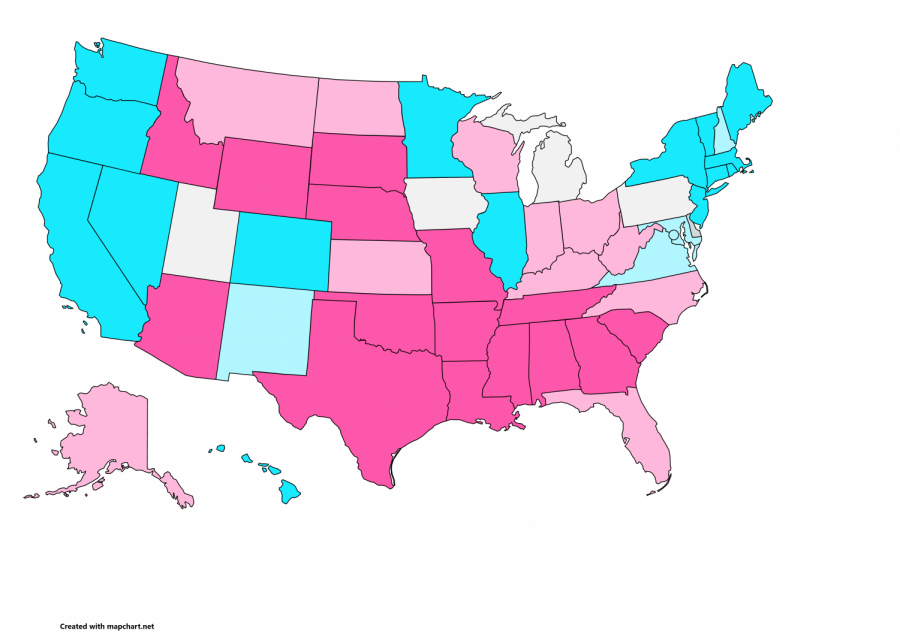On March 31, activists and communities across Florida celebrated the 12th annual International Transgender Day of Visibility. In Orlando, City Hall flew the trans pride flag for the first time, a step forward in a city which five years ago suffered the single deadliest incident of violence against LGBTQ people in U.S. history. It was announced that later this year, the city will host the National Trans Visibility March, the first time it will take place outside of Washington, D.C. March 31 was a day of victory.
It was also the day that the Florida Senate Committee on Health Policy voted to push forward the Fairness in Women’s Sports Act, eventually leading to its passage in the House. The bill would “require that anyone participating in girls and women’s sports at the K-12 and college level be biologically eligible to do so,” and “if challenged, they would have to get confirmation from a health care provider that they are female” through “medical inspections.” In short, it would ban trans women from competing in school sports, arguing that the higher levels of testosterone gives them an unfair advantage.
It’s also a lie. This bill, and the others like it that have been introduced in around 30 states over the past few months, is a travesty. It is a direct attack on our most vulnerable citizens, built on a tower of misleading lies and ludicrous examples. It is a trojan horse, an argument with just enough sliver of reality that lawmakers can justify themselves voting against the lives of our schoolchildren. And it is, as trans woman and journalist Emily VanDerWeff writes for Vox, “an attempt to kill us through the indifferent cruelty of bureaucratic measures.” Allowing trans women to play sports isn’t a political debate— it’s a human rights one.
A large part of why these transphobic bills have been able to gain ground nationwide is because of the flashy examples that lawmakers use, such as two trans girls in Connecticut who were sued by three of their cisgender competitors, alleging that the “male athletes” had stolen championships from them.
But that narrative doesn’t hold up. Transitioning isn’t a “choice,” and mischaracterizing it as such belittles what trans youth go through every day. No one is going to go through a life-altering process just to not place last at their local track meet.
The narrative also doesn’t have any real world examples. The Florida High School Athletics Association has allowed transgender students to participate in the sport of the gender with which they identify since 2013, and there has never been even a single complaint from athletes, a fact which Florida lawmakers were forced to acknowledge. As many activists and doctors have said, these bills are a solution in search of a problem.
“They’re acting like LeBron James is going to put on a wig and play basketball with fourth graders,” trans man and ACLU lawyer Chris Strangio told the New York Times. “And not one LeBron James, 100. In reality, you’re talking about little kids who just want to play rec sports. They just want to get through life.”
Far more threatening is the fraudulent science lawmakers have used to exploit general ignorance about transitioning. Core to this is the idea that testosterone confers an automatic advantage— an idea that, as Scientific American explains, is “unscientific.” The magazine explains that, not only up to 10% of all women have elevated testosterone levels, but the advantage the hormone confers is doubtful. And not only do many young trans women take hormone blockers and estrogen, but Science Magazine reports that even adult athletes lose any major advantage they had soon after transitioning.
“Every sport requires different talents and anatomies for success,” Olympics and NCAA advisor Dr. Eric Villian told NPR. “We should focus on celebrating this diversity, rather than on relative notions of fairness.”
But these bills are never based on fairness. They are based on fear. It’s questionable whether a single lawmaker supporting these bills actually cares about protecting high school women’s sports— if they did, they wouldn’t leave women’s sports criminally underfunded and ignored. Instead, lawmakers are using a nonexistent issue to enact very real discrimination.
Roughly half of the bills currently introduced nationwide, and which passed in Arkansas and Alabama, would ban gender-affirming medical care for trans youth. In addition, many of these bills hope to classify trans women as male under law, opening the door to future legal and legislative discrimination. Lawmakers aren’t debating whether trans youth should be in sports— they are debating whether they should have the right to exist.
And there is only one way to say this: these policies will result in adolescent deaths.
By restricting proven-safe medical care such as puberty-delaying treatment and hormone therapy, lawmakers are robbing trans youth of their adolescence and exposing them to systematically higher rates of bullying, anxiety and depression 5.9 times higher than the national average, according to LGBTQ youth advocacy group The Trevor Project.
When prevented from transitioning, the attempted suicide rate among trans youth is as high as 40%, reports by the National Institute of Health show. Giving trans youth the ability to transition essentially eliminates those depression rates and drops the suicide rate to the national average.
Initially, it looked like government bureaucracy might have prevailed against the bill. Florida law requires identical bills to be passed in the House and the Senate before being signed into law by the governor, and senators seemed unable to agree on a compromise before the end of the session on April 30.
But two days before the deadline, Republican leaders amended it onto a charter school bill with wider conservative support. Amid cries of procedural fraud and lawsuits, the bill passed in the Senate barely a day before the deadline, all but ensuring its enactment.
Fixing our laws starts with fixing the conversations surrounding them. Everyone should be part of the fight for trans rights, but we must also ensure that trans people are the arbiters of their own lives and their own laws.
“Every day that cis people guide most of the conversations about trans people is a day that further suggests our lives are not worth living as they are,” VanDerWeff writes. “We are not aberrations. Being trans is just another way to be human.”
Lawmakers blame trans women while simultaneously taking away the tools to help them. The game is already rigged against trans youth— keeping them out of sports doesn’t even the playing field.









